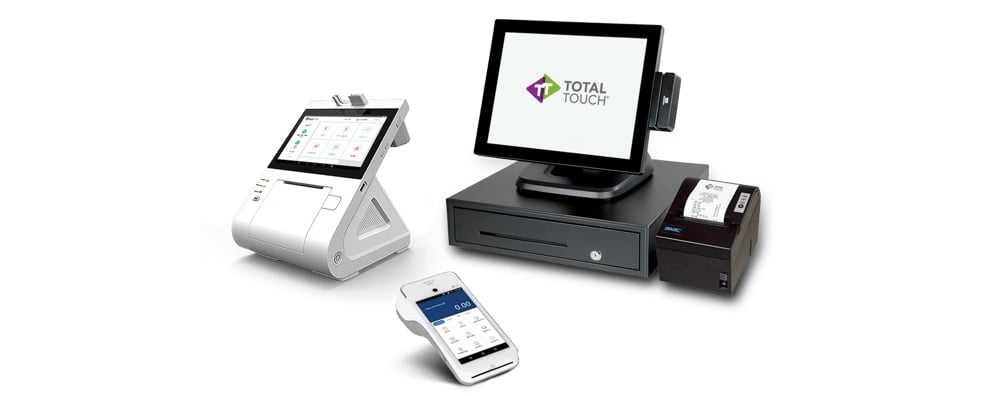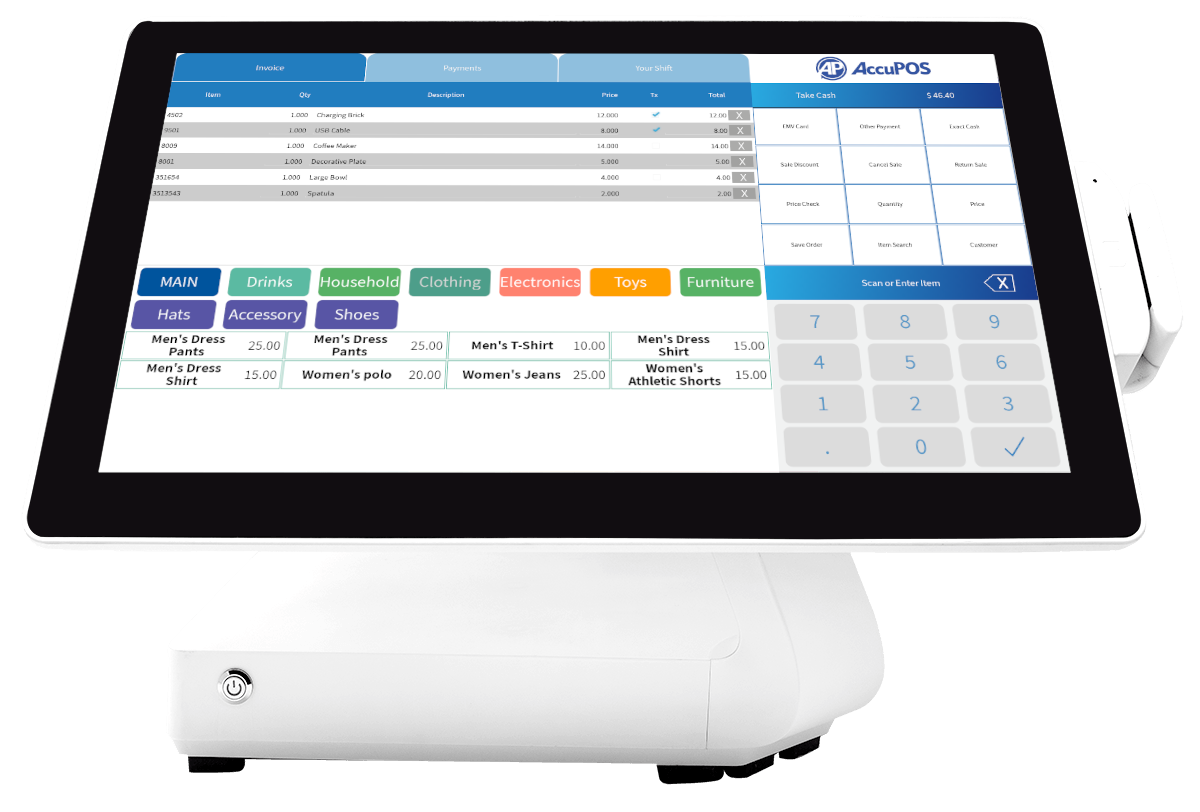The 8-Second Trick For Point Of Sale Software

POS Machine: Retail Point-Of-Sale Solutions Streamline Transactions
Some Ideas on Restaurant Pos You Should Know

Hardware Components of a Point of Sale System What makes a POS system tick? It's not simply software application; the hardware plays a starring function. Think of it as the body to the software's brain. Without the best hardware, even the most advanced POS software application is simply a pretty face. Vital POS Hardware So, what are the must-haves? Let's break it down. The main processing system, typically a computer system or tablet, is the heart of the operation. The display or touchscreen show allows personnel to communicate with the system. A barcode scanner accelerate the checkout procedure. Remember the days of manually entering each code? The dependable invoice printer offers consumers with a record of their purchase. A cash drawer keeps your money safe and arranged. A card reader enables customers to pay with credit or debit cards. Diving Deeper: Beyond the Essential But wait, there's more! Depending on your service, you may require specific hardware. A dining establishment might include kitchen printers to relay orders, while a retail shop may use label printers for product tagging. Ever wonder how your regional bakeshop immediately prints those delicious-looking labels? Picking the Right Hardware: A Balancing Act Choosing the right hardware isn't simply about purchasing the most expensive devices. It has to website do with discovering the sweet spot in between functionality, sturdiness, and spending plan. A small company simply starting may go with a more fundamental setup, while a high-volume seller will need robust, high-performance devices. Is it much better to buy new or utilized? Consider your alternatives thoroughly. A new system uses the most recent technology and service warranty defense, but a refurbished system can conserve you cash. The Future of POS Hardware What does the future hold? Anticipate to see a lot more integration with mobile devices, biometric scanners for employee authentication, and advanced analytics dashboards displayed on larger, clearer screens. Envision a world where inventory is automatically upgraded in real-time as items are scanned-- a world where you can track your very popular item from anywhere in the world. The possibilities are endless, and the hardware is constantly developing to fulfill the demands of today's companies. Are you prepared to update your point of sale system?
Software Application Features and Capabilities: The Heart of Your POS System
Ever view an experienced barista slide through a busy morning rush? Their trick isn't simply caffeine; it's a seamless dance with their POS system. The software application is the conductor of your organization symphony, orchestrating everything from sales to inventory. However what notes should you be listening for? What capabilities really matter in today's market?
Stock Management: Beyond Counting Beans
Forget spreadsheets that haunt your dreams. Modern POS systems use real-time inventory tracking, signaling you when your stock of artisanal coffee beans dips precariously low. Believe of it as a digital guardian angel, preventing those uncomfortable "Sorry, we're out!" moments to customers. What if you could also anticipate demand based upon historical information? Many systems now use forecasting tools, an effective weapon against overstocking and lost sales. This assists avoid the circumstance of running out of popular products or building up excess inventory of slow-moving products, both of which can constrain money flow and area.
Sales Reporting and Analytics: Translating the Data
Sales data is the brand-new gold, and your POS system is the miner. Forget feeling in one's bones just how much you sold today. Dive deep into the information to discover trends, determine your very popular items, and comprehend consumer habits. Which menu item sets completely with the day-to-day special? Which promotion resonated most with your customers? These insights are not simply fascinating; they're actionable intelligence. Without reputable sales reporting, navigating the complexities of company decision-making becomes like sailing without a compass, increasing the opportunity of missteps and missed out on opportunities.
Customer Relationship Management (CRM): Structure Bridges, Not Walls
Remembering a regular customer's name and preferred order is captivating, however scaling that personal touch is challenging. POS systems with CRM capabilities enable you to track customer purchase history, choices, and even birthdays. Envision instantly using a discount on their birthday-- a small gesture that promotes loyalty and motivates repeat service. However there is the possible snag of bad data quality, which can cause unreliable customer profiles and inadequate marketing efforts.
Payment Processing: Improving the Transaction
The checkout experience can make or break a sale. Seamless combination with various payment approaches-- charge card, mobile wallets, even copyright-- is non-negotiable. Can your system handle split payments? Does it offer protected tokenization to secure client data? A cumbersome payment procedure is like hitting a sour note in your service symphony, possibly interrupting the whole performance. Ensuring compatibility with developing payment innovations and adherence to security standards are vital for preserving client trust and operational performance.
Worker Management: Keeping the Team in Sync
From clocking in and out to handling consents and tracking performance, worker management includes enhance operations and enhance accountability. Is scheduling a nightmare? Many POS systems provide integrated scheduling tools, optimizing staffing levels based on forecasted demand. A common barrier that is typically neglected is the obstacle of incorporating employee management functionalities with payroll systems, which can result in errors and ineffectiveness in wage computations.
Advanced Features: Leveling Up Your Operations
- Table Management: Suitable for dining establishments, this feature enables you to visualize your dining-room, track table status, and handle appointments.
- Commitment Programs: Reward your finest consumers and motivate repeat business with incorporated loyalty programs.
- Online Purchasing Combination: Flawlessly integrate your POS system with online ordering platforms to broaden your reach.
Picking the ideal POS system has to do with more than simply performance; it has to do with discovering a partner that can grow with your business. Consider your existing needs, prepare for future growth, and don't be scared to ask the tough concerns. The right software can transform your business from a chaotic cacophony into an unified masterpiece.
Industry-Specific POS System Applications
Believe of the local bakeshop, bustling with early morning consumers craving fresh croissants. A generic POS system might deal with transactions, however can it handle complicated dishes, track ingredient stock, or immediately change production schedules based on sales information? Probably not. That is where the charm of industry-specific POS systems shines.
Restaurants and Hospitality
For bustling restaurants, speed and precision are critical. How lots of times have you seen servers handling orders, adjustments, and splitting bills, all while attempting to offer exceptional service? A restaurant POS system streamlines these processes, enabling table management, cooking area order tickets, and even online ordering combination. These systems typically consist of functions like ingredient-level inventory tracking, crucial for managing food costs and reducing waste. Ever question why your preferred dish is often not available? It might come from a lack of correct stock management.
- Table Management
- Kitchen Order Tickets
- Online Purchasing Combination
- Ingredient-Level Stock Tracking
Retail Solutions
Retail, with its varied inventory and client interactions, requires a various set of tools. Think of a store clothes store having a hard time to keep an eye on sizes, colors, and seasonal collections utilizing a basic checkout system. An industry-specific retail POS system offers functions like barcode scanning, customer loyalty programs, and detailed sales reporting. These systems can even incorporate with e-commerce platforms, supplying a seamless omnichannel experience for consumers. Did you know some retail POS systems can forecast future sales patterns based upon historic information? Now that is powerful!
The Perils of a Mismatch
Selecting the incorrect POS system can develop considerable operational obstacles. A clothing boutique using a restaurant POS, for example, would discover it inappropriate for managing inventory with sizes and colors. The absence of correct reporting and analytics could cause mistaken getting choices and lost earnings. The outcome could be similar to trying to fit a square peg in a round hole.
Key Considerations
Choosing an industry-specific POS system needs cautious assessment. Think of your organization's distinct requirements and operational workflows. Does the system incorporate with existing software? Does it offer the necessary reporting capabilities? Is it scalable to accommodate future development? A well-chosen POS system is not simply a transaction tool; it's a strategic asset that can drive performance, enhance customer complete satisfaction, and ultimately, increase your bottom line. Keep in mind, it is an investment in your company's future, not just an expenditure.
Security Considerations for Point of Sale Systems
Ever heard the tale of the mom-and-pop shop that lost whatever since of a single, neglected security flaw in their POS system!.?. !? It's a cautionary tale, and it highlights an important aspect frequently overshadowed by the allure of fancy features and structured operations. The truth is, a POS system is just as good as its security. What good is a system that crunches numbers in a flash if it enables lawbreakers to swipe customer's information just as rapidly?
The Vulnerability Minefield
The digital landscape is a battleground. Every POS system, regardless of size or elegance, is a possible target. Are you truly prepared for the hazards lurking around the corner? The real pinch comes when you find that your outdated software application has an open hole that hackers can exploit, turning your organization into an unwitting accomplice in identity theft. The problem is that hackers are crafty and are constantly changing their techniques.
Typical Security Gaps and Expert Tips
- Weak Passwords: "Password123" isn't sufficing. Use strong, special passwords for all POS system accounts and alter them frequently. Two-factor authentication is a must.
- Unsecured Networks: Your Wi-Fi resembles leaving the front door open. Secure your network with strong encryption (WPA3 if possible) and think about a different network for your POS system.
- Outdated Software Application: Software vendors spot security holes all the time. Stopping working to update is like inviting trouble. Establish automatic updates or schedule routine maintenance.
- Staff member Training: Your staff is your very first line of defense. Train them to recognize phishing attempts, protect passwords, and report suspicious activity.
Information File Encryption: Your Shield Versus the Dark Arts
Think of information file encryption as a secret code. It scrambles delicate details, like credit card numbers, making it unreadable to unapproved users. Without encryption, your consumers' monetary details resemble sitting ducks, ripe for the selecting by cybercriminals. It's not just about securing your customers; it has to do with safeguarding your track record and preventing hefty fines.
PCI Compliance: The Rulebook You Can't Overlook
If you accept credit cards, you're bound by the Payment Card Market Data Security Standard (PCI DSS) It's a set of security standards created to protect cardholder information. Failing to comply can lead to fines, charges, and even the loss of your ability to process charge card payments. It's a headache, yes, but it's a necessary one. Believe of PCI compliance as the expense of doing company in the digital age.
Consider this: every transaction processed through your point of sale is a possible entry point for harmful stars. By executing robust security steps, you're not simply protecting your organization; you're safeguarding your clients' trust and guaranteeing the long-lasting viability of your operations. The security of your POS system isn't just a technical problem; it's a company vital. It requires constant caution, proactive procedures, and a dedication to remaining ahead of the curve.